Several tea blends can enhance your peaceful nighttime routine. A chamomile and lavender blend offers a calming experience, reducing anxiety and promoting better sleep. For a potent sedative effect, try a valerian root sleep tonic, which can be complemented with passionflower or lemon balm. A passionflower serenity mix combines multiple relaxing herbs for evening tranquility. Lemon balm infusions provide stress relief and mental clarity, while a peppermint stress-relief combination eases tension with its cooling properties. Each blend offers unique benefits, from improving sleep quality to easing digestive discomfort. Exploring these options can help you find the perfect brew for your bedtime ritual.
Chamomile and Lavender Blend
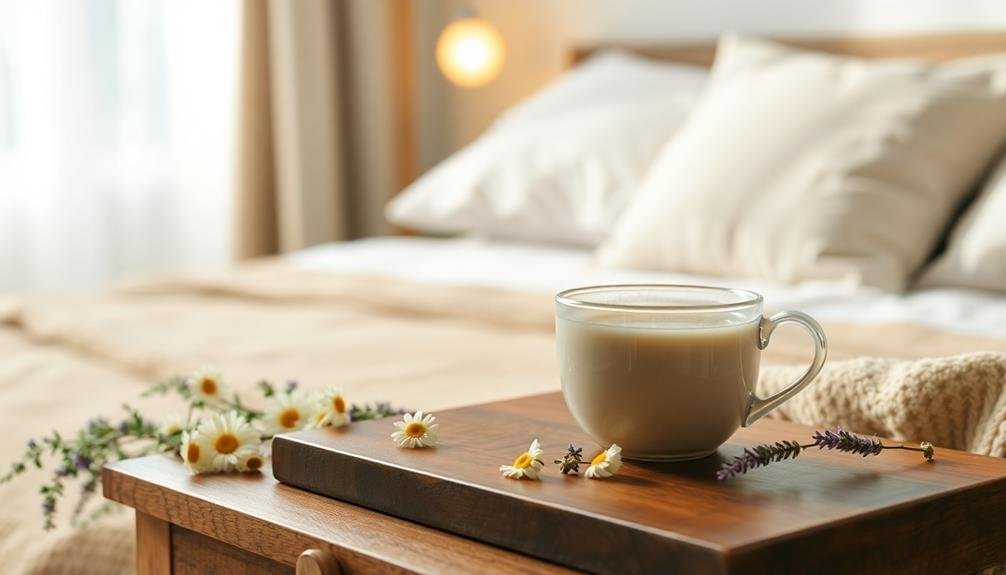
Combining two of nature's most soothing herbs, the chamomile and lavender blend is a powerhouse of relaxation. You'll find that chamomile's mild, apple-like flavor complements lavender's floral notes perfectly, creating a balanced and calming tea experience. This blend is known for its ability to reduce anxiety, promote better sleep, and ease digestive discomfort.
To prepare this blend, you'll need equal parts dried chamomile flowers and lavender buds. Steep a teaspoon of the mixture in hot water for 5-7 minutes, allowing the herbs to release their beneficial compounds. You can enhance the tea's flavor and effectiveness by adding a touch of honey or a slice of lemon.
Drinking this blend about an hour before bedtime can help you unwind and prepare for a restful night's sleep. It's caffeine-free, making it an ideal choice for your evening routine. Regular consumption may also improve your overall sleep quality and help regulate your sleep-wake cycle.
If you're sensitive to herbal teas, start with a small amount and gradually increase as tolerated. Remember, while this blend is generally safe, it's always best to consult with your healthcare provider before adding new herbal remedies to your routine.
Valerian Root Sleep Tonic
Nature's potent sleep aid, valerian root, takes center stage in this powerful sleep tonic. You'll find this herb's earthy aroma and sedative properties make it an excellent choice for promoting restful sleep.
To create a valerian root sleep tonic, steep 1-2 teaspoons of dried valerian root in hot water for 10-15 minutes. The longer steeping time allows the root's beneficial compounds to fully infuse into your tea.
For a more palatable blend, consider adding complementary herbs like passionflower or lemon balm. These herbs not only enhance the flavor but also contribute their own calming effects. You can sweeten your tonic with a touch of honey if desired, though it's best to avoid sugar before bedtime.
It's important to note that valerian root can be quite potent, so start with a small amount and adjust according to your needs. Some people may experience vivid dreams or grogginess the next morning, so it's wise to try this tonic on a night when you don't have early commitments.
Drink your valerian root sleep tonic about an hour before bedtime to allow its effects to take hold gradually.
Passionflower Serenity Mix
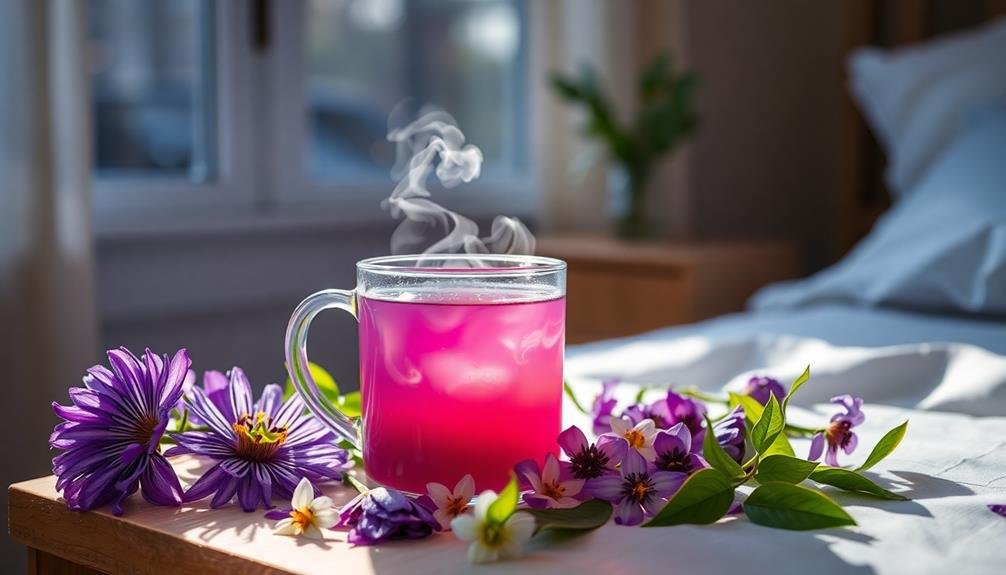
Embracing tranquility, the Passionflower Serenity Mix offers a gentle approach to evening relaxation. This soothing blend combines the calming properties of passionflower with complementary herbs to create a serene nighttime experience.
You'll find passionflower at the heart of this mix, known for its ability to reduce anxiety and promote restful sleep. Paired with chamomile, it enhances the overall calming effect, easing tension and preparing your mind for a peaceful night.
Lemon balm adds a subtle citrusy note while contributing to stress relief and mental clarity. To balance the flavor profile, a touch of lavender provides a floral aroma that further supports relaxation.
You might also detect hints of valerian root, which works synergistically with passionflower to improve sleep quality.
When preparing this blend, steep it for 5-7 minutes in hot water. It's best enjoyed about an hour before bedtime, allowing the herbs' properties to take effect gradually.
For an extra touch of sweetness, you can add a small amount of honey, which may also aid in sleep promotion. Incorporate this Passionflower Serenity Mix into your nightly routine to unwind and prepare for restorative sleep.
Lemon Balm Relaxation Infusion
While passionflower offers tranquility, lemon balm brings its own unique calm to your evening routine. This herb, known scientifically as Melissa officinalis, has been used for centuries to promote relaxation and reduce stress.
You'll find that lemon balm's mild, lemony flavor creates a soothing infusion perfect for winding down before bed.
To create your lemon balm relaxation infusion, start with 1-2 teaspoons of dried lemon balm leaves per cup of hot water. Steep for 5-10 minutes, allowing the herb's calming properties to infuse fully.
You can enhance the blend by adding complementary herbs like chamomile or lavender, which work synergistically with lemon balm to promote sleep.
Studies have shown that lemon balm can improve sleep quality and reduce anxiety. It's particularly effective in calming an overactive mind, making it ideal for those nights when racing thoughts keep you awake.
The herb's natural compounds, including rosmarinic acid and flavonoids, contribute to its relaxing effects. As you sip this infusion, you'll likely notice a gentle easing of tension and a growing sense of tranquility, preparing your body and mind for a restful night's sleep.
Peppermint Stress-Relief Combination
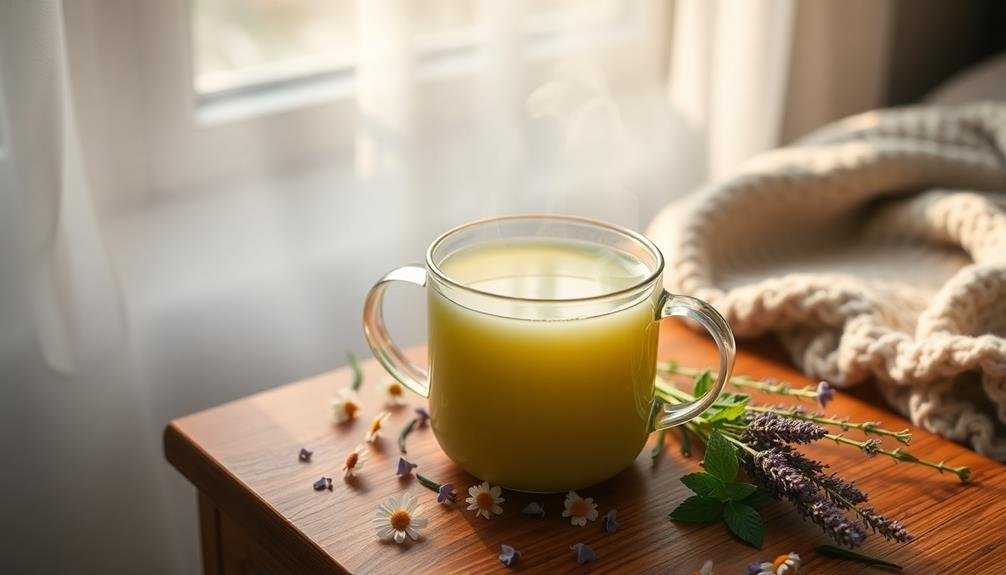
For a revitalizing twist on stress relief, consider incorporating peppermint into your nighttime tea blend. This invigorating herb isn't just for uplifting morning brews; it can also promote relaxation and ease tension before bed. Peppermint's natural menthol content helps soothe digestive discomfort and clear your mind, making it an excellent addition to your evening routine.
To create a peppermint stress-relief combination, try pairing it with other calming herbs. Here's a simple guide to get you started:
| Herb | Benefits | Ratio |
|---|---|---|
| Peppermint | Digestive aid, mental clarity | 2 parts |
| Chamomile | Relaxation, sleep aid | 1 part |
| Lavender | Anxiety relief, aromatherapy | 1 part |
Blend these herbs in the suggested ratios, adjusting to your taste preferences. Steep a tablespoon of the mixture in hot water for 5-7 minutes. You'll enjoy a soothing cup that combines peppermint's cooling properties with chamomile's gentle sedative effects and lavender's calming aroma. This blend can help you unwind after a long day, easing both mental and physical tension. Remember to sip slowly and mindfully, allowing the tea's benefits to fully envelop you as you prepare for a restful night's sleep.
Frequently Asked Questions
How Long Before Bedtime Should I Drink Sleep-Promoting Tea?
You should drink sleep-promoting tea about 30-60 minutes before bedtime. This timing allows your body to absorb the calming compounds and start winding down. Don't consume it too close to sleep, as you'll need to use the bathroom.
Can I Add Sweeteners to My Nighttime Tea Without Affecting Its Benefits?
You can add sweeteners to your nighttime tea, but it's best to use natural options like honey or stevia. Avoid sugar, as it may disrupt sleep. Use minimal amounts to preserve the tea's calming benefits.
Are There Any Potential Side Effects of Regularly Consuming Sleep Teas?
While generally safe, regular consumption of sleep teas may cause mild side effects. You might experience drowsiness, upset stomach, or headaches. Some herbs can interact with medications. It's best to consult your doctor if you have concerns.
Can I Drink These Teas During Pregnancy or While Breastfeeding?
While pregnant or breastfeeding, you'll want to be cautious with herbal teas. Some herbs can affect your baby. It's best to consult your healthcare provider before consuming any sleep teas during these periods.
How Do Caffeine-Free Herbal Teas Compare to Over-The-Counter Sleep Aids?
You'll find caffeine-free herbal teas are a gentler, more natural alternative to over-the-counter sleep aids. They don't have side effects or risk of dependency. However, they may work more subtly and gradually than medication.
In Summary
You've now discovered several soothing tea blends to enhance your nighttime routine. By incorporating these calming brews into your evening, you'll be setting yourself up for a more peaceful night's sleep. Remember, consistency is key. Make it a habit to enjoy your chosen blend about an hour before bed. As you sip, take deep breaths and let the day's stress melt away. Sweet dreams await you with these natural sleep aids.

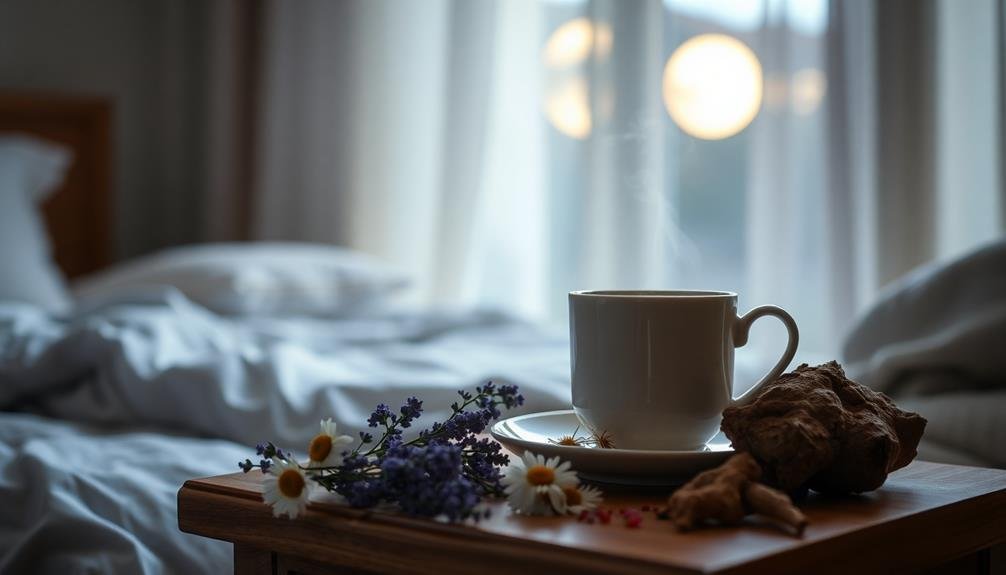
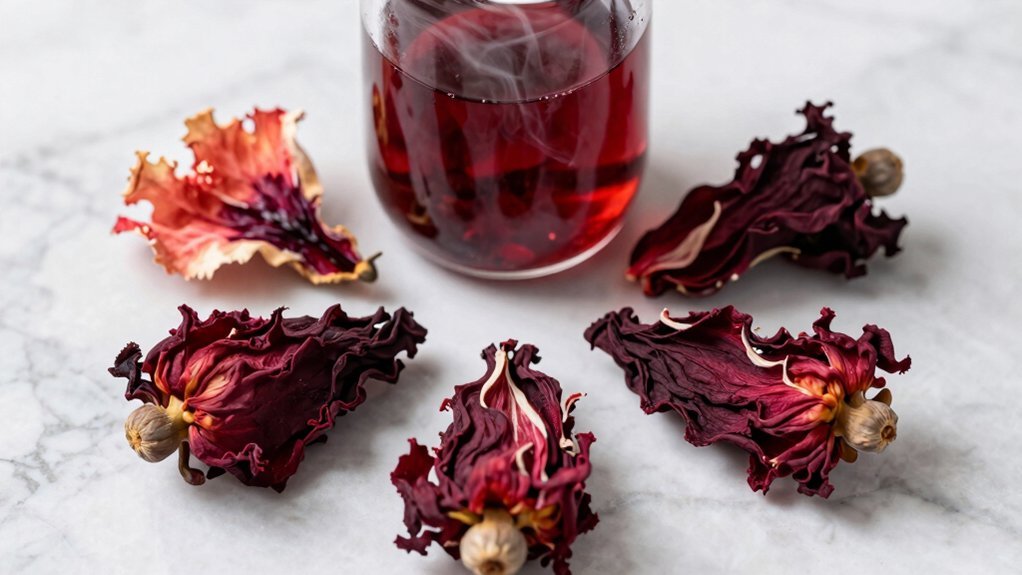


Leave a Reply